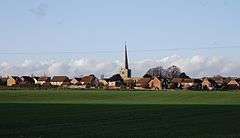Hoo St Werburgh
| Hoo St Werburgh | |
 Hoo St Werburgh, Rochester, Kent. |
|
 Hoo St Werburgh |
|
| Population | 8,945 (2011)[1] |
|---|---|
| OS grid reference | TQ779725 |
| Civil parish | Hoo St Werburgh |
| Unitary authority | Medway |
| Ceremonial county | Kent |
| Region | South East |
| Country | England |
| Sovereign state | United Kingdom |
| Post town | ROCHESTER |
| Postcode district | ME3 |
| Dialling code | 01634 |
| Police | Kent |
| Fire | Kent |
| Ambulance | South East Coast |
| EU Parliament | South East England |
| UK Parliament | Rochester and Strood |
Coordinates: 51°25′23″N 0°33′29″E / 51.423°N 0.558°E
Hoo St Werburgh is one of several villages on the Hoo Peninsula to bear the name Hoo, meaning 'spur of land'. It constitutes a civil parish in the unitary authority of Medway in South East England. It was, until 1998,[2] administered by Kent County Council, but is still part of Kent with which it is ceremonially associated via the Lieutenancies Act.[3] It had a population of 7,356 at the 2001 census, increasing to 8,945 at the 2011 Census.[1]
History
St. Werburgh was the daughter of King Wulfhere of Mercia, and niece of King Æthelred, his brother and successor. She was born between 640 and 650.
The first church of Hoo St Werburgh may have been built in the reign of the 8th century King Æthelbald of Mercia, though presumably a monastery existed nearby at an earlier time.[4] This, together with land at Hoo All Hallows, is likely to have been placed under the rule of the leading Mercian monastery of Medeshamstede, now known as Peterborough.[5]
A significant, and possibly unique, feature of this ancient parish church are the two Royal hatchments of Queen Elizabeth I and King James I. These were later restored and can be viewed in the church. The Reverend Ferdinando Booth of the same family as Archbishop Lawrence Booth was vicar here from 1675-1680.
The parish records of 1851 gave the population as 1,065.
Broad Street appeared as Brodestrete in 1478.[6] Jacobs Lane is named after the family of Stephen Jacobe of Hoo (1480). A workhouse was in use here until the 1930s, and the secondary school bears the name "The Hundred of Hoo Academy".
Education
Hoo is served by two schools. These are Hoo St Werburgh Primary School and The Hundred of Hoo Academy.
Hoo St Werburgh Primary School is for pupils aged 4 – 11 years of age. There are a total of 386 pupils arranged into 14 classes with two classes per year group in the main school. Attached to the school is the Marlborough Centre which caters for children diagnosed as autistic. The centre has 54 children arranged into six classes.[7]
The Hundred of Hoo Academy is for pupils aged 11 – 18 years of age. There are a total of 1,600 pupils. The school caters for secondary aged pupils from various villages on the Hoo peninsula.[8]
Notable residents
Thomas Aveling, of British agricultural engine and steam roller manufacturer Aveling and Porter, lived in Hoo St Werburgh and is buried in the graveyard.
Declan Galbraith, who is best known for his 2002 hit single "Tell Me Why", which peaked at #29 in the UK Singles Chart, is from Hoo St Werburgh.[9]
See also
- Hoo Peninsula
- Strood
- Rochester
- Kent
- Rochester and Strood (UK Parliament constituency)
- Æthelred of Mercia
- Medeshamstede
References
- 1 2 "Civil Parish population 2011". Neighbourhood Statistics. Office for National Statistics. Retrieved 1 October 2015.
- ↑ "Medway Council – Local history: Medway in the 20th century 1901 – 2000". web.archive.org. 2009. Archived from the original on March 9, 2009. Retrieved 9 June 2012.
- ↑ "Lieutenancies Act 1997". legislation.gov.uk. 2012. Retrieved 9 June 2012.
- ↑ Anglo-Saxon Charter S 233 Archive Peterborough. British Academy ASChart project. Retrieved on May 11, 2008.
- ↑ Brooks, N. P., The Early History of the Church of Canterbury, Leicester University Press, 1984, 193-7, 205.
- ↑ The Place Names Of Kent, Judith Glover, 1976, Batsford ISBN 0-905270-61-4. "Broad Street".
- ↑ http://www.hoo-st-werburgh.medway.sch.uk/
- ↑ https://www.hooschool.co.uk/index.phtml?d=25217
- ↑ Roberts, David (2006). British Hit Singles & Albums (19th ed.). London: Guinness World Records Ltd. p. 146. ISBN 1-904994-10-5.
External links
| Wikimedia Commons has media related to Hoo St Werburgh. |